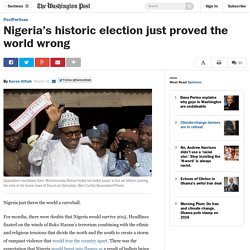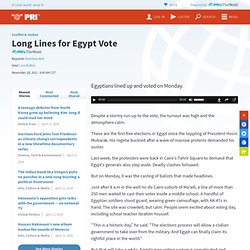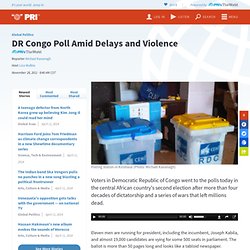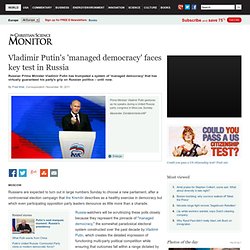

Nigeria’s historic election just proved the world wrong. Opposition candidate Gen.

Muhammadu Buhari holds his ballot paper in the air before casting his vote in his home town of Daura on Saturday. (Ben Curtis/Associated Press) Nigeria just threw the world a curveball. For months, there were doubts that Nigeria would survive 2015. Headlines fixated on the winds of Boko Haram’s terrorism combining with the ethnic and religious tensions that divide the north and the south to create a storm of rampant violence that would tear the country apart. But over the weekend, Nigeria, a country of 170 million, gave the world a largely peaceful and credible election, with its most transparent vote to date. Celebrations erupted after Nigerian President Goodluck Jonathan conceded defeat to opposition candidate Muhammadu Buhari.
Nigerians took to social media to congratulate Buhari and express relief at holding a vote without violence. This election challenges the notion of Nigeria’s ills as based on north vs. south, Christian vs. Long Lines for Egypt Vote. Egyptians lined up and voted on Monday.

Despite a stormy run-up to the vote, the turnout was high and the atmosphere calm. These are the first free elections in Egypt since the toppling of President Hosni Mubarak. His regime buckled after a wave of massive protests demanded his ouster. Last week, the protesters were back in Cairo's Tahrir Square to demand that Egypt's generals also step aside. Deadly clashes followed. But on Monday, it was the casting of ballots that made headlines. Just after 8 a.m in the well-to-do Cairo suburb of Ma'adi, a line of more than 250 men waited to cast their votes inside a middle school. "This is a historic day," he said. But that will take a while. Khaled Fowzi is a 32 year-old businessman. "Each candidate has his own team who hands out fliers. While the relative calm was a good sign, handing out fliers near polling stations is technically a violation of the ban on last-minute campaigning. But she said religion isn't the top issue for her as a voter.
DR Congo Poll Amid Delays and Violence. Voters in Democratic Republic of Congo went to the polls today in the central African country's second election after more than four decades of dictatorship and a series of wars that left millions dead.

Eleven men are running for president, including the incumbent, Joseph Kabila, and almost 19,000 candidates are vying for some 500 seats in parliament. The ballot is more than 50 pages long and looks like a tabloid newspaper. One election official in a polling station in the capital Kinshasa said in this district alone there are just under 1,000 candidates for parliament. Just getting ballots to the 63,000 polling stations across the country has been a challenge — Congo is practically the size of Western Europe, with extremely poor roads. It's covered by the second largest tropical rainforest in the world. "It's a very large country and there are a number of logistical problems. "What can I do," she said. For 19-year-old Maryous Ntumba, it's his first time voting. "History has changed. Why opposition is urging voters to sabotage ballots in Russia election.
Vladimir Putin's 'managed democracy' faces key test in Russia. Russians are expected to turn out in large numbers Sunday to choose a new parliament, after a controversial election campaign that the Kremlin describes as a healthy exercise in democracy but which even participating opposition party leaders denounce as little more than a charade.

Skip to next paragraph Subscribe Today to the Monitor Click Here for your FREE 30 DAYS ofThe Christian Science MonitorWeekly Digital Edition Russia-watchers will be scrutinizing these polls closely because they represent the pinnacle of "managed democracy," the somewhat paradoxical electoral system constructed over the past decade by Vladimir Putin, which creates the detailed impression of functioning multi-party political competition while ensuring that outcomes fall within a range dictated by the Kremlin.
Since Mr. "Putin's main idea is that democracy is impossible in a country of angry, poor people," says Sergei Markov, a Kremlin-connected Duma deputy with the ruling United Russia party (UR). Www.ipu.org/pdf/publications/free&fair06-e.pdf.